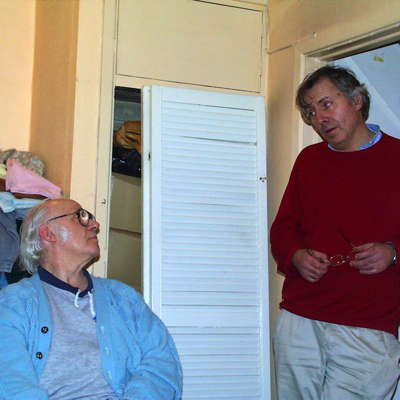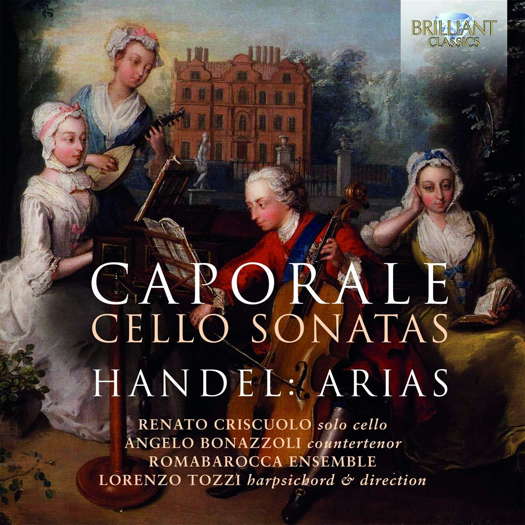 DISCUSSION: John Dante Prevedini leads a discussion about Composers, individuals or collective?, including contributions from David Arditti, Halida Dinova, Robert McCarney and Jane Stanley.
DISCUSSION: John Dante Prevedini leads a discussion about Composers, individuals or collective?, including contributions from David Arditti, Halida Dinova, Robert McCarney and Jane Stanley.
- Czech Philharmonic Orchestra
- Bramwell Tovey
- percussion music
- Ahmet Adnan Saygun
- Alexander von Zemlinsky
- Ilanah Lobel-Torres
- Lewis Carroll
- Beauty and the Beast
 25 YEARS: Classical Music Daily celebrates twenty-five years of daily publication with an hour-long video featuring some of our regular contributors.
25 YEARS: Classical Music Daily celebrates twenty-five years of daily publication with an hour-long video featuring some of our regular contributors.

Handel and the Roman Baroque School
GIUSEPPE PENNISI listens to
Lorenzo Tozzi's Romabarocca Ensemble
'... a precious CD from which to learn little known aspects of baroque music ...'
In my recent review of Alessandro Melani's L'Empio Punito (Classical Music Daily, 5 October 2019), I emphasized the importance of the Roman Baroque School in George Frederic Handel's formative years. This new Brilliant Classics recording shows clearly how this influence lasted for several years, maybe forever. The CD sets side-by-side Handel and a then famous (but now hardly known) cellist, Andrea Caporale. The record does not deal with Handel's early compositions but with his best London years. At that time, Frederick, Prince of Wales had discovered a real love for what was then the lowest of the string instruments: the cello. He had opted to learn the cello as a part of musical education.
Within this context, Handel invited to London one of the best and most appreciated Italian cellists, Andrea Caporale, and adapted for cello and harpsichord arias from some of his own most successful operas - Parnaso in festa per gli sponsali of Teti and Peleo; Deidamia. In parallel, the now almost forgotten Caporale had a vast production of his own compositions, mostly sonatas. Romabarocca Ensemble, created and led by Lorenzo Tozzi, had a great idea in producing this CD; the recording is dedicated to His Royal Highness Prince Charles, Prince of Wales.
The CD has two principal merits: the discovery of a nearly forgotten repertory and the appreciation of splendid and technically demanding cello sonatas. Caporale's cello sonatas have previously been recorded only a very few times; these recordings are now difficult to find. I retrieved one of them from the web; it sounded quite boring and lacked the musical cello enamel. This very enamel makes the beauty of the Romabarocca Ensemble performance. The round sonorities are also due to the careful mastering of the sound engineer, Alessandro Panetta.
Handel's operas have been recorded several times, especially in 2009 on the occasion of the composer's 250th anniversary when, inter alia, a CD box set was released with six operas performed by Alan Curtis and his Complesso Barocco. However, to the best of my knowledge, this is the first time that adaptations for cello and harpsichord (as desired by the Prince of Wales) have been played and recorded.
Caporale's elegant virtuoso writing has sophisticated embroidery quite different from the flowery baroque at that time in fashion in Naples and Venice. The embroidery is the feature that enthralled the Prince of Wales and the United Kingdom Court. It is real delight for the listener not only for the musicologist in search of different categories of baroque music.
Listen — Caporale: Vivace (Sonata No 1 in A)
(track 4, 0:00-0:37) © 2019 Brilliant Classics :
Listen — Caporale: Cantabile (Sonata No 5 in F)
(track 18, 0:00-0:42) © 2019 Brilliant Classics :
If we go to the arias with cello obbligato, a good sample is the recitative and arioso of the opera Deidamia (Act 1, Scene 2) also because it can be compared with Alan Curtis' 2003 recording of the entire opera published by EMI Records Ltd/Virgin Classics.
Listen — Handel: Due bell'alme innamorate (Deidamia)
(track 8, 0:00-0:55) © 2019 Brilliant Classics :
The cello and harpsichord adaptation by Romabarocca Ensemble (with the countertenor Angelo Bonazzoli) is more dramatic than the recitative and arioso recorded in 2003.
In short, a precious CD from which to learn little known aspects of baroque music and to appreciate its rendering by Romabarocca.
Copyright © 2 November 2019
Giuseppe Pennisi,
Rome, Italy

CD INFORMATION: CAPORALE: CELLO SONATAS; HANDEL: ARIAS
FURTHER INFORMATION: ANDREA CAPORALE
FURTHER INFORMATION: GEORGE FRIDERIC HANDEL
FURTHER INFORMATION: BRILLIANT CLASSICS


